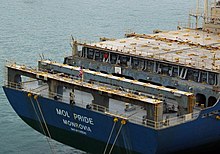
Back علم الملاءمة Arabic Rahat bayraqlar Azerbaijani Удобен флаг Bulgarian Pavelló de conveniència Catalan Bekvemmelighedsflag Danish Ausflaggung German Σημαία ευκαιρίας Greek Flago de oportuno Esperanto Pabellón de conveniencia Spanish Mugavuslipp Estonian


Flag of convenience (FOC) is a business practice whereby a ship's owners register a merchant ship in a ship register of a country other than that of the ship's owners, and the ship flies the civil ensign of that country, called the flag state.[1] The term is often used pejoratively, and although common, the practice is sometimes regarded as contentious.
Each merchant ship is required by international law to be registered in a registry created by a country,[2] and a ship is subject to the laws of that country, which are used also if the ship is involved in a case under admiralty law. A ship's owners may elect to register a ship in a foreign country so as to avoid the regulations of the owners' country, which may, for example, have stricter safety standards. They may also select a jurisdiction to reduce operating costs, avoiding higher taxes in the owners' country and bypassing laws that protect the wages and working conditions of mariners.[3] The term "flag of convenience" has been used since the 1950s. A registry which does not have a nationality or residency requirement for ship registration is often described as an open registry. Panama, for example, offers advantages such as easier registration (often online), the ability to employ cheaper foreign labour, and an exemption on income taxes.
The modern practice of ships being registered in a foreign country began in the 1920s in the United States when shipowners seeking to serve alcohol to passengers during Prohibition registered their ships in Panama. Owners soon began to perceive advantages in terms of avoiding increased regulations and rising labor costs and continued to register their ships in Panama even after Prohibition ended. The use of open registries steadily increased, and in 1968, Liberia grew to surpass the United Kingdom with the world's largest ship register.
Traditional maritime nations, mainly from Europe, responded to this practice with creation of so called "second registers" - open registries, using national flags or flags of semi-sovereign offshore dependencies.[4] That process begun in 1984 with the Isle of Man registry created as a second UK register. Soon after Norway and the Netherlands followed this practice adopting Netherlands Antiles and Norwegian International Ship Register (NIS) respectively. France established in 1989 Kerguelen Islands Register (replaced by International French Register (Registre International Français - RIF in 2005[5]) and Germany (Federal Republic of) created German International Register (GIS) in the same year. Last two registries are still (2024) considered as FOC-s.[6]
As of 2024[update], more than half of the world's merchant ships in terms of deadweight tonnage are registered in open registries or FOC-s.[7]
- ^ Bernaert, 2006, p. 104.
- ^ ICFTU et al., 2002, p. 7.
- ^ Kemp, 1976.
- ^ Carlisle, Rodney (2009) [2009-07-01]. "Second Registers: Maritime Nations Respond to Flags of Convenience, 1984-1998" (pdf). The Northern Mariner / Le Marin Du Nord. XIX - 2009. Canadian Nautical Research Society: 319–340. doi:10.25071/2561-5467.320.
- ^ "France | Guide to Ship Registries". www.guidetoshipregistries.com. Retrieved 30 August 2024.
- ^ Cite error: The named reference
itf-listwas invoked but never defined (see the help page). - ^ Cite error: The named reference
reviewwas invoked but never defined (see the help page).
© MMXXIII Rich X Search. We shall prevail. All rights reserved. Rich X Search